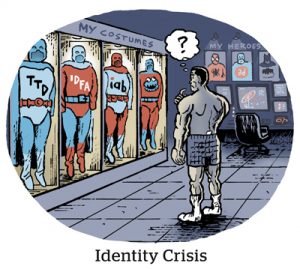Here’s today’s AdExchanger.com news round-up… Want it by email? Sign up here.
All A-Board
The W3C created a board of directors and filed to become a 501(c)(3) nonprofit. Hooray!
You seem unenthused.
It may sound dull, but this is important news.
MIT informed the W3C last year that it would no longer host the organization. But with or without MIT, the W3C had outgrown its original structure.
The W3C was maintained in certain geographies by host universities without a central organization. Tim Berners-Lee, founding director of the W3C and known as the inventor of the internet, must approve proposals and officially mint new standards – the “arbiter of consensus” is his official role.
But Berners-Lee doesn’t personally support some W3C initiatives, including advertising privacy and web3 proposals. The result is a years-long bottleneck, because proposals simply aren’t approved and thus can’t jump from smaller working groups to official standardization.
The new board includes reps from four host universities, as well as seven elected members: Robin Berjon (soon-to-be former VP of data governance at The New York Times; he leaves the job this week, actually), Eric Siow (Intel Corp.’s director of web standards), Koichi Moriyama (chief security architect at the Japanese mobile provider NTT Docomo), David Singer (Apple’s manager of software standards), Mark Nottingham (Cloudflare’s standards lead), Hongru Zhu (GM of standardization at Alibaba) and Léonie Watson (a long-time W3C leader and also director of consultancy TetraLogical).
Last Laugh
Netflix is tightening its belt.
Although it expects a forthcoming ad-supported tier to help curb subscriber losses, in Hollywood the show must go on even when fewer people are paying.
Several streaming platforms are throwing money at original content. Netflix still outspends every other streaming service. It’s known for spending big on original comedy specials and for its pay-outs to comics, which sometimes reach as high as $1 million, WSJ reports. But, recently, Netflix has been signing one- or two-year-long deals to license stand-up specials, rather than buying the content outright. Perhaps something in the Netflix data shows that, unlike a hit TV series that may be watched for years after it’s done producing new episodes, a comedy special drives viewership for a moment in time and has less durable ROI.
With Netflix cooling off on comedy, media giants might see an opening to grab some original production deals from under Netflix’s nose. A hit stand-up special that touches a cultural nerve could end up back on the market for other streamers to buy or license themselves after a year or two.
Kitchen Table Issues
Selling kitchen and grocery staples has become a huge endorsement opportunity for sports stars and other celebrities – even more so in some cases than common commercial tactics like selling their own lines of clothes, sneakers, cosmetics or jewelry.
Last week, Pop-Tarts announced a partnership with online fashion store Depop and a group of influencers to manufacture clothing styles inspired by Pop-Tarts flavors. (Don’t think too hard about that.)
A week before that, NBA star Chris Paul introduced a new line of plant-based chips, puff and popcorn-type snacks in partnership with Gopuff.
Digital publishers are also setting up shop in the kitchen. Recipe videos have been BuzzFeed’s bread and butter for years, and BuzzFeed also sells kitchen appliances. But The New York Times just announced it will begin selling home recipe kits curated by guest chefs (starting with Caribbean, Japanese and Indian meal starter sets). And last Friday, Food52, a recipe and cooking publisher that sells kitchen appliances, took its first step into selling pantry items. (H/t @iiiitsandrea of the Snaxverse)
But Wait, There’s More!
Why Meta is skeptical of data clean rooms. [Ad Age] … but, in other news, complaints abound about Meta. [TechCrunch]
How A+E Networks cross promotes podcasts to improve discovery. [Digiday]
TikTok says the “cooking with NyQuil” trend had just five user searches before the FDA’s warning made it go viral. [BuzzFeed]
Meet Taiv, a Canadian ad tech startup that lets bars and restaurants swap typical TV ads playing on the screens in their establishments for ads from Taiv’s network in return for up to $500 a month. [Refresh Miami]
Health apps share your health-related concerns with advertisers. HIPAA can’t stop it. [WaPo]
You’re Hired!
Roku Media hires Fox Entertainment CEO Charlie Collier as president. [MediaPost]














